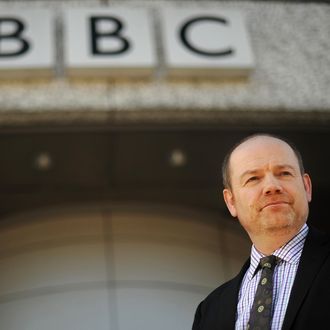
Mark Thompson is scheduled to start in three weeks as the CEO of the New York Times Company, but before he gets to work ushering the Paper of Record further into the digital age, he might have to deal with some uncomfortable glances in the hallway. Thompson, it was revealed after he was hired, left his role as the director general of the BBC with some unanswered questions swirling internally about late TV personality Jimmy Savile, who was accused of sexually abusing as many as 200 girls. The Times public editor, for one, is demanding answers — and what paper could be better at getting them?
While Thompson was still in charge in Britain, the BBC show Newsnight canceled its investigation into the Savile matter, with the corporation opting to air tribute programs to the legendary host instead. Thompson has claimed, “I was not notified or briefed about the Newsnight investigation, nor was I involved in any way in the decision not to complete and air the investigation.”
But because the potential cover-up is being called the “worst crisis” at the broadcaster in 50 years, fiery Times ombudsman Margaret Sullivan is calling for further digging into Thompson’s role in the scandal by the paper he’s about to help run:
How likely is it that he knew nothing? A director general of a giant media company is something like a newspaper’s publisher. Would a publisher be very likely to know if an investigation of one of its own people on sexual abuse charges had been killed? The answer to that is not as easy as it sounds. Because of the intentional separation between editorial and business-side operations, publishers usually don’t know about editorial decisions — unless they are very big ones, fraught with legal implications.
Sullivan, praised in her first month on the job for taking on tough issues, goes as far as to ask “how likely is it that the Times Company will continue with its plan to bring Mr. Thompson on as chief executive?” In her view, “His integrity and decision-making are bound to affect The Times and its journalism — profoundly. It’s worth considering now whether he is the right person for the job, given this turn of events.”
To clear things up, Sullivan suggests the Times itself “might start by publishing an in-depth interview with Mr. Thompson exploring what exactly he knew, and when, about what happened at the BBC.”
Asked if that was a realistic possibility, awkwardness aside, Times spokesperson Eileen Murphy told Daily Intel, “We don’t make a habit of commenting in advance about stories that may run in The Times. Having said that, we’ve been reporting on the BBC story and we will continue to report.”





























